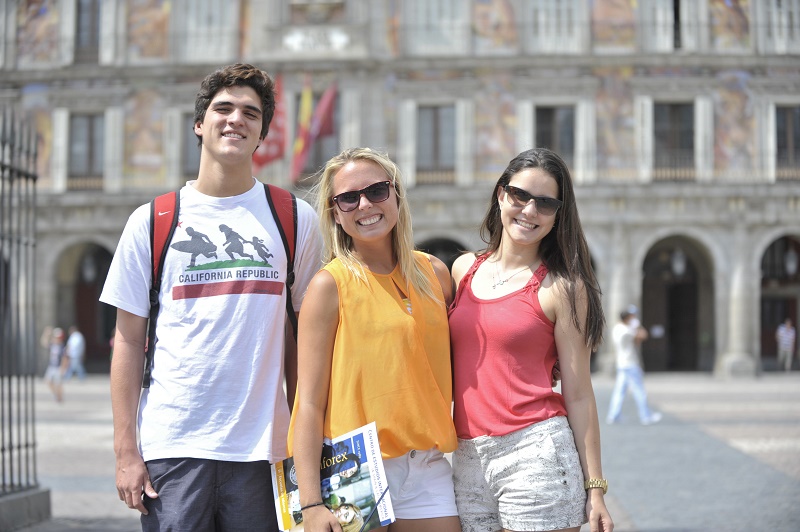Learning a language course abroad in another country is one of the most frequent academic objectives among students from all over the world. In addition to the obvious benefit of “linguistic immersion”, seriously considering the study of one or two languages abroad entails additional laudable goals for young students. Among these, we point out the search for a certain independence and the notion of experiencing “living alone”.
Make new friends and meet people from different cultures and backgrounds. Explore in depth a country or city of interest. Understand the educational system of the chosen nation with the idea of completing university studies in the first cycle (undergraduate) or second cycle (postgraduate). Testing an international labor market with a view to possible emigration.
The learning of a language abroad is often linked to the specific objective of emigration. In fact, mastering a foreign language is the first step to emigrate.
Young and professional adults need to demonstrate the use of foreign languages, such as English and French, to participate in the selection processes of the so-called economic emigration programs of nations such as Canada, Australia, and New Zealand.
The decision, therefore, is highly relevant, not only because of the economic investment it represents for the participant but also because of the impact that learning will have on the next steps of the potential emigrant.

Language course abroad
Planning a language course abroad entails certain difficulties. Indeed, doubts abound and go through such simple questions as for where, how and when. It is encouraged to think about the budget, the goals that are expected to be achieved with the language learned and in the time available for studies. The following tips extend the points indicated and give light for planning a trip abroad by linguistic immersion:
1. Establish the budget
![]()
As it is popularly said: “You have to start at the beginning”. Defining the amount of money available for the course determines everything: the place of study, the institution, the study program, the type of accommodation, the time devoted to the execution of the objective, etc.
The costs of a language course abroad vary considerably depending on the country selected and the type of institution, but there are ways to save. For example, an academic destination close to the place of origin implies a valuable economy in the price of the air ticket.
With a limited budget, a sensible solution would be to take the basic levels in the country and consider the course abroad once an intermediate degree has been reached in the language of interest. In this way, economic investment abroad will be more profitable.
When it comes to formulating the budget, it is important for the student to understand that he/she will not be able to work while studying. Ordinarily, a student does not have a work permit while engaged in their studies. In Canada, the United States and Australia, sometimes, they are allowed to work part-time in free hours and weekends. In general, they are the typical student jobs: innkeeper, kitchen assistant, the employee in the university library or academic preparer. However, the salaries paid in these occupations will never be enough to cover school fees. Therefore, the interested party must have all the money necessary to pay for their studies.
In the specific case of Venezuelans, who must process the acquisition of dollars at a preferential rate for students, through the official body Cadivi, it is recommended not to leave the country until approved and available money to cover the studies and maintenance. It is preferable to delay the period of commencement of classes than to fail to pay for the lack of the respective remittance.
2. Set the study period

It consists of determining how much time the student can afford to live abroad. The duration of language learning programs varies three or four weeks, three months, six months or one year. When the objective is focused on achieving total bilingualism, linguistic immersion of one year is the most advisable. On the other hand, if you are looking to improve the basic or advanced skills that you already have, a three-week course will be very useful.
If the purpose is to prepare for an immigration process, such as the interview with the Canadian immigration officer, or the presentation of language proficiency tests required of candidates for immigration (IELTS, TOEFL, DALF, etc.), with great probability a month of intense studies will suffice.
In any case, if difficulties arise in this aspect, they will have to be exposed to the language institute. Serious academics know how to determine the level that a student can achieve in each course and the time required for it.
3. Choose the destination

The decision of all the sleepless nights: where am I going to study? The options are several and include North America, Europe and – good news! – the Antilles. The United States and Canada always favor the preferences of Latin Americans because they are classic academic destinations, which enjoy an excellent reputation for the quality of education and the high standard of living and security they provide to university students.
Canada, in particular, offers the great advantage of its status as an officially bilingual country, where you can learn English and French in the same locality. In addition, those interested in emigrating to that American nation, take advantage of the academic stay as an exploratory trip. A study stay of three months and more brings points to a candidate in the so-called Canadian Point System.
The Antilles look like a very favorable destination for Latin Americans because of its geographical proximity. Places like Trinidad and Tobago stand out for their vast offer of English courses, at highly competitive prices and with the prestige of a British education. An additional advantage: the student will feel obligated to speak English and will not be tempted to socialize in Spanish, as happens in North American cities that register a high proportion of the Hispanic population.
The requirement of a student visa also becomes a key factor in selecting the destination. In some countries, you do not need a visa to study, while in others it is only required for courses that exceed three months. It is suggested, therefore, to review the conditions of the study visas of Canada, the United States, and Australia before making the decision.
For its part, Australia attracts countless students from Spain, thanks to the binational agreement that allows Spaniards to study in Australia.
Finally, it is decisive to choose an attractive place, where the student feels comfortable. We refer to a country that interests you, where you can carry out pleasant extracted activities and local tourism incentivize you with good ideas for the weekend and free time.
4. Address the reasons for the climate

If you prefer a country with four climate seasons, such as the United States or Canada, you must plan the course for the summer. This warning is especially important for those who come from tropical regions, unaccustomed to the rigors of winter.
On the contrary, if the student wishes to live the winter experience, he must include in his budget a sum destined to the acquisition of the winter clothes, which can be expensive.
It is insisted, nevertheless, on the summery time to consider it propitious for the enjoyment of extracted activities and the exchange with other people; since the days are longer and invite to socialize, which increases, consequently, the possibilities of practicing the language.
5. Choose the study institute

Without a doubt, another crucial decision. In this stage, many factors must be analyzed: the quality of teaching of the institute (better if there is a reference); the academic offer, including the diversity of courses and programs; the location in the selected city (safe or central area, with access to basic services: restaurants, bus stops, etc.); Extra facilities for international students, such as: accommodation, visa management, medical insurance, etc.
The prestige of the institute is measured by its years of existence, the references of current and previous students, the quality of its faculty, the official records endorsed by the official authorities of the country, and the visibility of its commercial brand.
One aspect to be observed consists of the institutional offer of the preparation programs for the most known academic sufficiency exams, such as IELTS, TOEFL, TEF, DALF, etc., and if it has the appropriate infrastructure to administer the corresponding tests.
6. Find accommodation
Another important issue lies in determining where to stay. We then refer to the first council on the list: the budget. This will determine the type of suitable stay. You can choose between student residences, accommodation in family homes (very popular and usually include one or two meals) and a vast variety of hotels and hostels of various prices and amenities. Numerous language institutes present packages that include accommodation. This offer is usually advantageous for international students.










